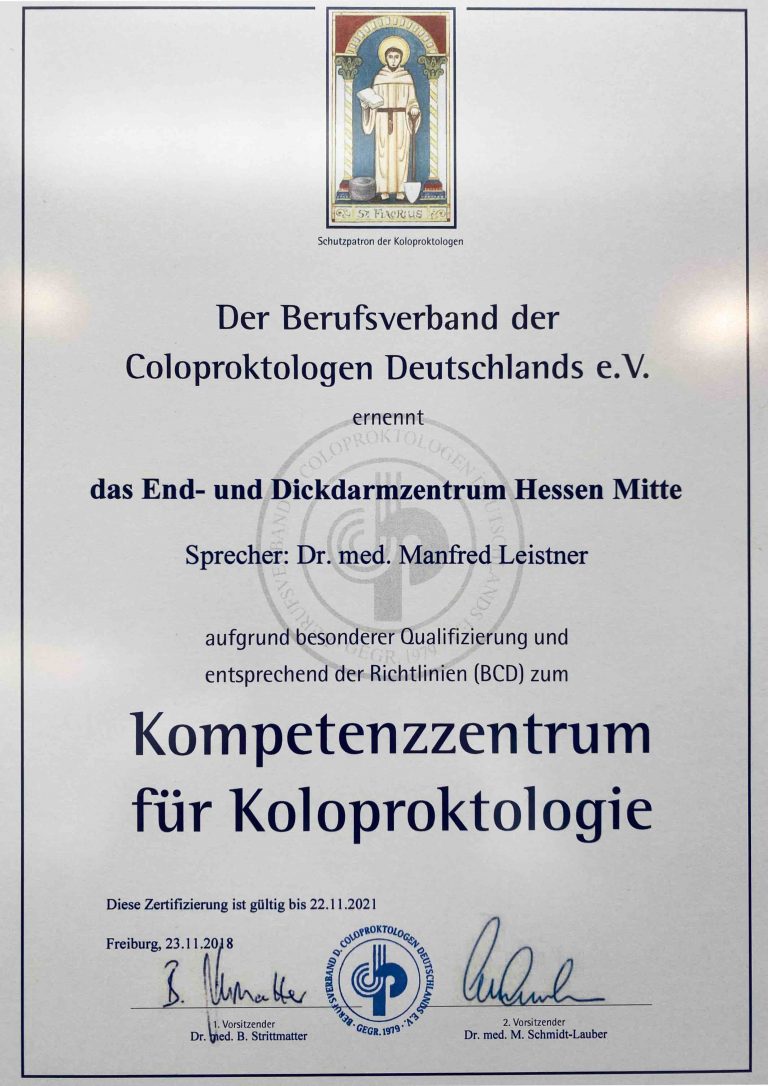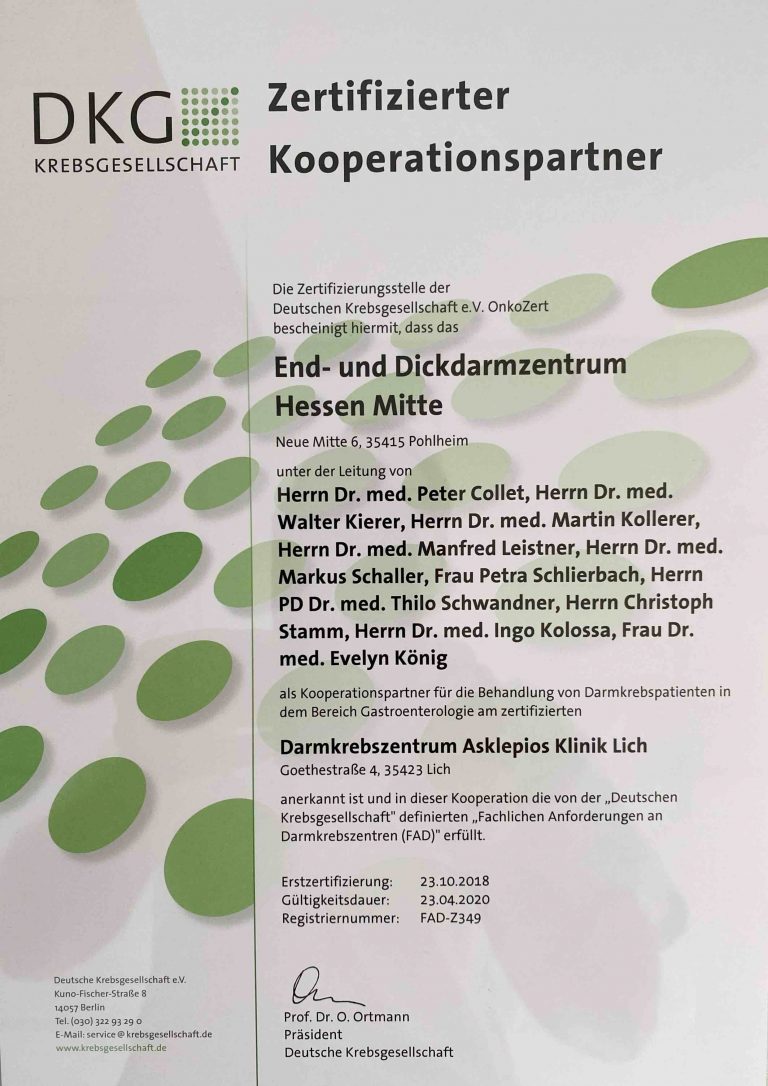Darmkrebszentrum in Kooperation mit der Asklepiosklinik Lich
 Darmkrebs ist die häufigste Krebserkrankung in Deutschland. Die Erkrankung kann mit Erfahrung und guter Kooperation der Fachgebiete im lokalisierten Stadium mit hoher Wahrscheinlichkeit geheilt werden. Durch hochspezialisierte Chirurgie, je nach Stadium auch zusammen mit modernster internistisch onkologischer Behandlung und Strahlentherapie, sind auch bei fortgeschrittenen Tumoren und Metastasen Heilungen zu erwarten. Als Team setzen wir unser bestes Können gegen diese Erkrankung ein, um unseren Patienten die höchste Behandlungsqualität zu bieten.
Darmkrebs ist die häufigste Krebserkrankung in Deutschland. Die Erkrankung kann mit Erfahrung und guter Kooperation der Fachgebiete im lokalisierten Stadium mit hoher Wahrscheinlichkeit geheilt werden. Durch hochspezialisierte Chirurgie, je nach Stadium auch zusammen mit modernster internistisch onkologischer Behandlung und Strahlentherapie, sind auch bei fortgeschrittenen Tumoren und Metastasen Heilungen zu erwarten. Als Team setzen wir unser bestes Können gegen diese Erkrankung ein, um unseren Patienten die höchste Behandlungsqualität zu bieten.
Unser Streben
Höchste nachvollziehbare Qualität in Diagnostik und Therapie
Optimale Patientenorientierung/Patienteninformation
Wirksame Maßnahmen zur Vorbeugung
Unser Team hat langjährige Erfahrung in der Behandlung des Darmkrebs. Besondere Erfahrung haben wir auf dem Gebiet der minimalinvasiven Tumorchirurgie und der Behandlung der Peritonealkarzinose.
Wir behandeln an unserem Darmkrebszentrum interdisziplinär Patienten mit Darmkrebs (Dick- und Enddarmkrebs) in allen Stadien. Unsere Kompetenz für alle Aspekte der Behandlung der Darmkrebserkrankung ist unser gemeinsames Merkmal. Wir können damit dem wichtigsten Bedürfnis der Patienten bei der Klinikwahl, nämlich einer umfassenden Behandlung, die sich nicht nur auf Teilaspekte beschränkt, nachkommen.
Im nationalen Krebsplan werden Organzentren als Basis für die qualitativ beste Versorgung der häufigsten Tumorarten gefordert. Unser Darmkrebszentrum ist nach den stringenten Vorgaben der Deutschen Krebsgesellschaft zu allen Aspekten der Erkrankung „Darmkrebs“ strukturiert und wurde 2018 von der Deutschen Krebsgesellschaft als Organzentrum erstzertifiziert.
Diagnostik und Behandlung
Die exakte Diagnostik ist unverzichtbare Voraussetzung für beste Behandlungsergebnisse. Zusammen mit unserem interdisziplinären Team aus Gastroneterologen und Radiologen setzen wir alle endoskopischen und radiologischen Methoden zur schonenden Untersuchung unserer Patienten ein. Vor Behandlungsbeginn werden Patienten mit Enddarmkrebs und fortgeschrittenem Dickdarmkrebs in unserer wöchentlichen Interdisziplinären Tumorkonferenz zur individuellen Festlegung des Behandlungskonzepts besprochen. Für den Chirurgischen Eingriff bieten wir langjährige Erfahrung mit Spezialisierung auf höchstem Niveau, modernsten Konzepten und überdurchschnittlicher Qualität. In die Patientenbetreuung sind nicht nur Ärzte, sondern auch Psychoonkologen, hochmotiviertes Pflegepersonal und Vertreter der Selbsthilfegruppe ILCO eingebunden. Die wichtigsten Voraussetzungen für optimale Behandlungsresultate aus chirurgischer Sicht wurden von uns zum Teil federführend wissenschaftlich analysiert und hochrangig publiziert.
Unser Leistungsspektrum bei onkologischen Erkrankungen im Überblick
alle gängigen Operationsverfahren zur Tumorresektion (Resektion: Entfernung)
minimalinvasive Resektion des Dick- und Enddarms bei Karzinomerkrankung (Karzinom: bösartiger Tumor)
alle transanalen (durch den After erfolgenden) Tumorabtragungsmethoden
multiviszerale (mehrere Organe betreffende) Resektionen
interdisziplinäre (fachübergreifende) Operationen
Magenresektion
Metastasenresektion
psychoonkologische Betreuung
individuelle Stomaberatung (Stoma: künstlicher Darmausgang)
Zertifikate


